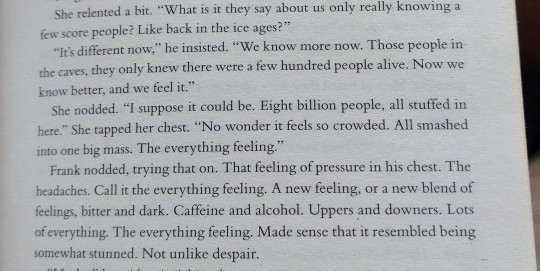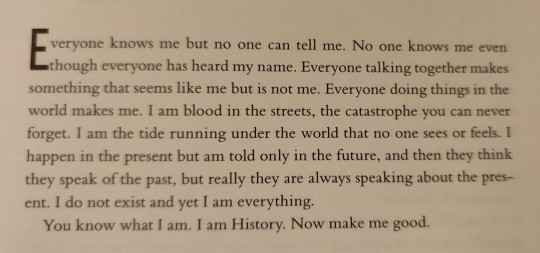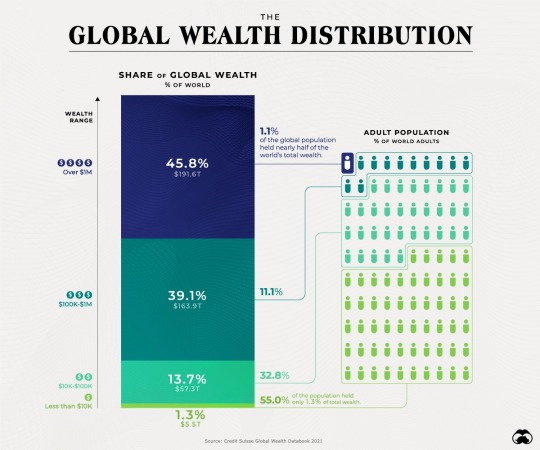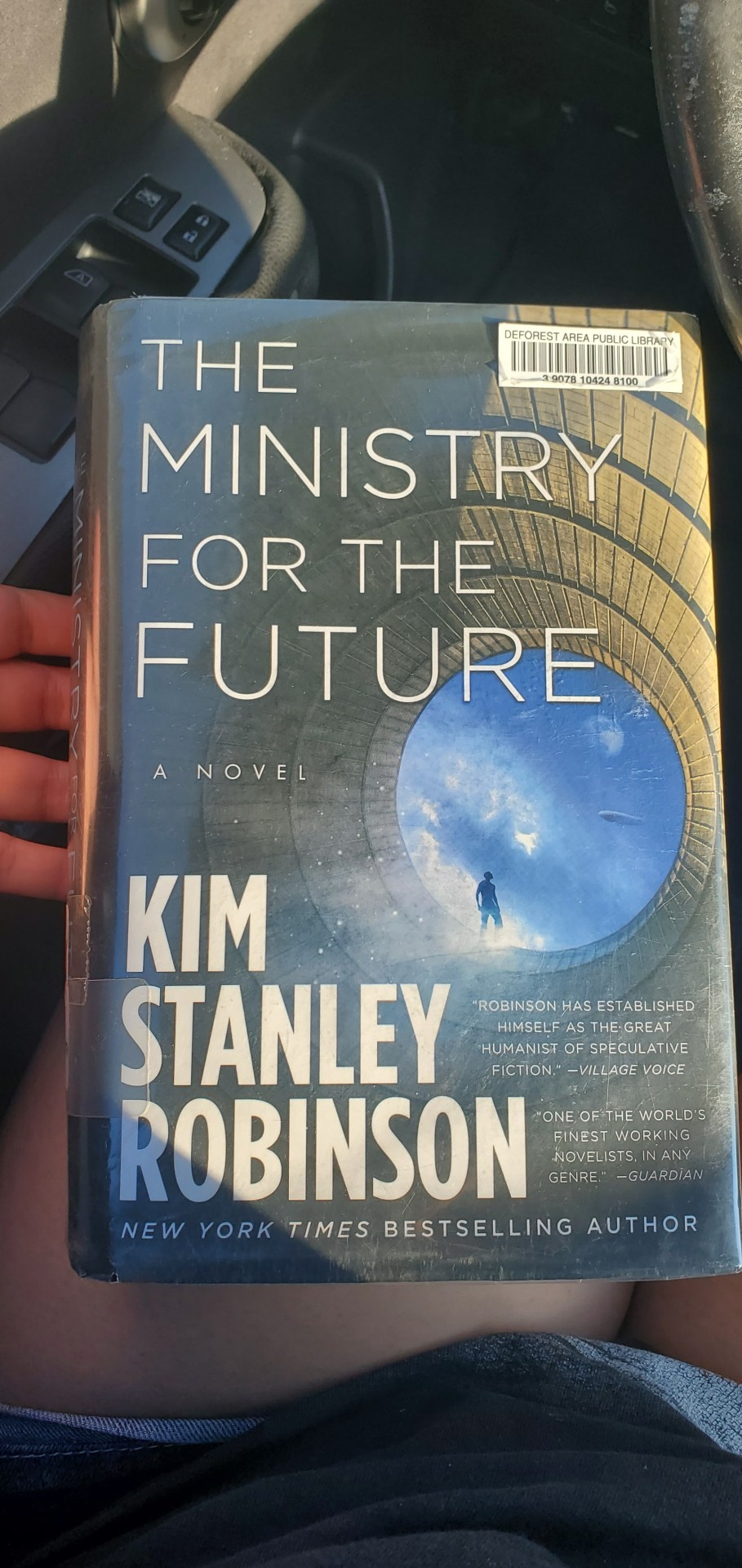#The Ministry for the Future
Text

vote yes if you have finished the entire book.
vote no if you have not finished the entire book.
(faq · submit a book)
5 notes
·
View notes
Text

"Ideology, n. An Imaginary relationship to a real situation"
"Easier to imagine the end of the world than the end of capitalism..."
#ksr#kim stanley robinson#the ministry for the future#2020#sci fi#scifi#science fiction#climate change#books
5 notes
·
View notes
Text
Reading Journal

The Ministry for the Future by Kim Stanley Robinson.
Wow!
I fell in love with the Mars Trilogy, then liked 2312 well enough and now I'm reading this next one and it blows my mind. I love everything about it, the voice, the thoughts. I have only just started so there will be much more to think about but my first wish was to experience a discussion between the author and Steven Pinker. I looked for it to see if it is already happening, but it seems to be my private ship. Still, there are people out there comparing their takes on both of these thinkers which is the next best thing.
21 notes
·
View notes
Text

2 notes
·
View notes
Text
Reading: The Ministry for the Future, Kim Stanley Robinson.
Holy shit.
I’m about 20% of the way through and this book is crawling inside my head. The quote on the Dover describes it as a “science fiction nonfiction novel,” which seemed interestingly enigmatic before I started the book and perfectly apt now that I’ve met its mix of present-day climate science fact and near-future pending-climate-disaster sort-of-fiction. I say “sort of” because it is distressingly plausible and feels like the present. It is a world that might well exist in my lifetime, and in yours. It is a clear-eyed and unflinching portrayal of inequality and its consequences, the limitations of economic “science,” the humanity at the heart of everything, neoliberalism’s fundamental flaws, the fact that the point is not economic growth. The point is people, and our prosperity, and our right to live and live well.
Might be the best book I’ve read so far this year, or at least, I haven’t been this engrossed this quickly by a book in… a long time.
#personal#currently reading#the ministry for the future#book rec#environmentalism#climate change#climate science#science fiction#sff#me#book reviews
9 notes
·
View notes
Text

4 notes
·
View notes
Text
Books I read in 2023
This is a bit late, but I wanted to post about the books I read last year, partly because it's fun and partly because I think it'll motivate me to read more in 2024. I'm excluding books I read for classes unless there's something I have to say about them, and I'm also excluding one nonfiction, political book I read at the start of the year, because I don't remember it well enough to share my opinions accurately.
Fiction
The Ministry for the Future (2020) by Kim Stanley Robinson
A pretty good book; it's about various groups working in the near future to fight climate change, some of which resort to extralegal tactics. It presents a pretty bleak future with a high level of impact from climate change; I thought it was good, but if you're the type of person who catastrophizes about climate change it may not be the best book for you. There's a lot of procedural stuff and description of how organizations work, too — it's not just describing suffering. This book has a moderately anti-capitalist message.
Invisible Man (1952) by Ralph Ellison
Reading this book is an interesting experience; Ellison's writing style is often quite surreal and reading can feel like walking through thick grass. If you don't like that, you may not want to read this book. It's about an African-American man who moves from the South to New York in the 20th century (pre-Civil Rights Movement), and his experiences along the way. There are strong political messages here, although they're less obvious 70 years on. Black nationalism/separatism are discussed and critiqued, and the main character ultimately ends up isolated from society.
The Truth (2000) by Terry Pratchett
This is a fantasy novel about the first newspaper in a society. It's pretty great — one of the best of the Discworld books I read this year. It's got a pro-journalism message.
Going Postal (2004) and Making Money (2007) by Terry Pratchett
These two Discworld novels, in a medieval fantasy setting, are both about Moist von Lipwig, a clever criminal who's spared from execution by the city's mostly-benevolent tyrant and forced to become a civil servant instead. He reopens the postal system and invents fiat currency (in this way we get a look at the institutions of our own civilization), becoming more ethical and exposing corruption along the way. Both books are good, but I think Going Postal is a little better.
Huda F Are You? (2021) and Huda F Cares? (2023) by Huda Fahmy
These are a pair of semiautobiographical graphic novels about a Muslim teenager growing up in Michigan. Huda F Are You? focuses on the protagonist's struggle to define her identity and make friends in middle school; it was emotionally engaging and quite relatable. I wish I had been able to read it when I was in middle school! Huda F Cares? focuses on the protagonist's relationship with her siblings and her struggle to practice her religion, despite prejudice from society and her friends' at times differing values. I found it slightly less compelling than Huda F Are You?, but still definitely a book worth reading! Perhaps that's because I'm an irreligious only child.
Klara and the Sun (2021) by Kazuo Ishiguro
This book is definitely science fiction, but it has a much more personal and melancholy tone than most sci-fi books. It's told through the perspective of an unusually perceptive and empathetic robot who worships the Sun, in a world where... well, it would be spoilers to talk about how different the world is! Let's just say that the book explores loneliness, intelligence and its relationship to society, and the possible effects of technological progress. I've heard that this book is supposed to deal with AI, but I found its message to be pretty far from the concerns raised by recent advances in large language models (LLMs) and image generation. I'd say that social media (vis-a-vis a decline in real-world socialization) and pre-LLM automation relate to the book's world more than today's AIs. Klara and the Sun is also very well-written.
Nonfiction
Musicophilia: Tales of Music and the Brain (2007) by Oliver Sacks
A fascinating exploration of the psychological and neurological aspects of humanity's affinity for music, this book strings together a series of anecdotes from the author's time practicing medicine about how music affects the brain, especially among people with rare brain disorders. There are some truly fascinating — and surprising! — cases discussed. These are interspersed with explanations of what we know, and don't know, about why music has such an effect on the human brain. Overall, this book was quite interesting, and I recommend it to anyone with even a passing interest in these sorts of topics.
#the ministry for the future#invisible man#discworld#klara and the sun#huda f are you#musicophilia#reading
1 note
·
View note
Text
i absolutely love teenagers. i told a group of them about my work and asked them what their demands for the united nations would be and they debated among themselves and told me to "tell them to make doner kebab three euros again". yeah man i'll ask
#no joke ive been citing this as a positivr example for youth engagement to anyone in the ministry who will listen#teens SHOULD be advocating for everyday problems they face like the cost of living crisis and not be#shouldered with the responsibility for the entire future#'teenagers are the future' they are also the fucking present. allowed to have ordinary problems like everyone else!!!#dont fucking burden them with your shortcomings! you figure it out!!!!
14K notes
·
View notes
Text
I can forgive The Ministry for the Future for basing such a big part of its climate change solution on blockchain, seeing how the author admitted in retrospect to having done cringe there, but the fact that there's a part about Russia making sooper dooper modern unstoppable missiles because it has such a sooper dooper sophisticated advanced futuristic industry should be enough of an explanation as to why near-future sci-fi just tends to be a bad idea in general.
0 notes
Text
I’m almost done with The Ministry for the Future and I gotta say it has made me nearly cry with how much I want that future
#like that one chapter where all the ppl got together and said which earth healing projects and groups they represented from which countries#i was nearly in tears at work#good thing I mostly work in the back lol#the ministry for the future#l’histoire de ma vie
0 notes
Text
Book Review: "The Ministry for the Future" by Kim Stanley Robinson
0 notes
Text
Enough to go round?
I’m reading Kim Stanley Robinson’s excellent novel, if you can call the unfolding of the pending climate catastrophe a work of fiction, “The Ministry for the Future.” He interweaves scenes of unfolding climate emergencies – a devastating heat wave in India which kills millions – with short vignettes describing our current circumstances. For example, concerning our current, hugely inequitable…

View On WordPress
#a novel#climate change#fiction#global inequality#Kim Stanley Robinson#the future#The Ministry for the Future#wealth inequality
1 note
·
View note
Text
25.02.23
I fear this never-ending winter fog will be all my children will know
Smog coloured skies, the heaviness of my exhale
The taste of grit and smoke in my lungs,
clinging like the ash of a drilled rotting cavity
A life promised in a respirator*; the paid experience for continued existence
The colour of blue found only in ink pens and unseen paintings
No clouds, puffy white
petrichor only existing as typed, lost within an unread dictionary
Will they ever look to the night sky and see more than fogged streetlights?
Will they ever dream of more?
Will they ever truly see, behind their ever-present goggles, protection from this hostile landscape?
I still see the first spring rain, warm mist over the winter lingering snow, the sun peering over the spotting showers.
Will they even know of snowflakes?
*Life not included. Life Respirators may cause difficulty breathing, decreased lung function, wheezing, chest pain, dry throat, headache, nausea, of death. Ask your doctor if Life Respirator is right for you.
#writing prompt#My writing#climate crisis#climate#inspired by#the ministry for the future#and my local smog#capitalism#poetry
0 notes
Text

0 notes
Text
One weird trick to make monopolies self-destruct

Kim Stanley Robinson’s 2020 novel Ministry For the Future was a groundbreaking work: it’s the tale of a detailed, plausible transition from a world on a collision course with civilization-ending climate catastrophe to one where the challenge is met, with humanity collectively deciding to save itself:
https://pluralistic.net/2020/12/03/ministry-for-the-future/#ksr
Robinson’s book is important: it not only disproves the (variously attributed) capitalist realism aphorism that “it is easier to imagine the end of the world than it is to imagine the end of capitalism” — it also imagines the means by which that ending was brought about.
It’s a tale of what I’ve called “The Swerve”: the day we stop listening to the first class passengers at the front of the bus that’s barreling towards a cliff, rush the driver and yank the wheel before we go over the edge:
https://locusmag.com/2022/07/cory-doctorow-the-swerve/
Since the book’s publication, it has been the subject of intense foment, such as the excellent Crooked Timber seminar on the book’s strengths, flaws, and future:
https://pluralistic.net/2021/05/12/seminar-for-the-future/#imaginations
The latest project inspired by the book comes from NESTA and The Prospect: Minister For the Future is a series of policy proposals to someone holding that office, as proposed in Robinson’s novel, for dealing with inequality, food, demographics, networks, mental health, automation, pandemics, health, and other subjects:
https://www.prospectmagazine.co.uk/specialreports/minister-for-the-future
I also contributed a piece: “Enticing monopolies to unwind themselves,” which addresses the existential risk of monopolies: when monopolies reign, it is all but impossible to make good policy, because the monopolists can outbid all comers and turn every truth-seeking exercise into an auction that they win:
https://www.prospectmagazine.co.uk/politics/enticing-monopolies-to-unwind-themselves
That is, after all, the story of the climate emergency itself: a handful of giant firms colluding to distort science, delay action — and risk billions of lives to make trillions of dollars. Monopolies create superdense concentrations of power that, like a black hole, warp the normal rules:
https://pluralistic.net/2022/12/05/eldritch-physics/#wouldnt-start-from-here
The best time to tackle monopolies would have been 40 years ago, when all over the world, regulators stopped enforcing anti-monopoly law. The second best time is now. Lucky for us, antitrust regulators have the bit between their teeth and have vowed to halt the march towards market concentration, blocking mergers rather than waving them through:
https://pluralistic.net/2021/08/13/post-bork-era/#manne-down
They’ve also promised to take on existing monopolies, unwinding the predatory acquisitions and anti-competitive mergers that produced so much concentration in so many industries, which now rule over their regulators, hurting us in a million ways with utter impunity:
https://www.openmarketsinstitute.org/learn/monopoly-by-the-numbers
But while breaking up monopolies is important work, it’s also slow work. It took 69 years to break up AT&T!
https://doctorow.medium.com/podcasting-jam-to-day-c451dd289f2
Blocking future monopolies without ending existing ones is a huge risk. Any monopoly in an industrial supply chain can destroy the smaller firms it buys from and sells to. Think of how Big Pharma’s mergers let it gouge hospitals on drug prices, leading to regional hospital monopolies that had the bargaining power to push back. But then those hospitals turned around and started screwing insurers, who also formed regional monopolies in order to defend themselves from price-gouging.
In the end, monopoly leads to monopoly, with workers and consumers at either end of the supply chain, unorganized and vulnerable, which is why health workers make less money under worse conditions and patients spend more money for worse care. It’s not enough to prevent future monopolies — we also have to break up the ones that are all around us.
How can we make that happen without waiting 69 years while the monopolists use their vast cash reserves and influence to delay the reckoning? That’s where my proposal comes in.
https://www.prospectmagazine.co.uk/politics/enticing-monopolies-to-unwind-themselves
I am old enough to remember when corporate raiders took over companies in order to break them up and sell them for parts, rather than merging them into monopolies. Rapacious, remorseless finance assholes once stalked the corporate world, shattering firms with impunity.
What if we brought those monsters out of retirement for one more job?
My proposal is simple: a two-year capital gains tax holiday on profits from unwinding any 21st century merger involving a firm with more than £10b in market cap: “Watch them do in months what decades of courtroom grinding couldn’t hope to accomplish.”
This is a very Ministry For the Future kind of idea — one of the novel’s subplots involves bribing oil companies to leave oil in the ground by buying up all their stranded assets, and swallowing the galling proposition of giving still more money to the people who wrecked the planet.
I’m ambivalent about my proposal for the same reason I was ambivalent about Robsinson’s stranded-assets thought-experiment. But the last time I talked with Robinson, he shrugged and said, “We’ll just take it all back with a wealth tax.”
https://www.youtube.com/watch?v=Dfgfh3SYu8Y
The whole “Minister” package is a fascinating one, and there is something extremely refreshing about imagining a post-Swerve future, where high officials are bent on actually addressing our most urgent problems, backed by an unstoppable political will.
Image:
Sam Valadi (modified)
https://www.flickr.com/photos/132084522@N05/17086570218/
CC BY 2.0
https://creativecommons.org/licenses/by/2.0/
Jimmy Baikovicius (modified)
https://www.flickr.com/photos/jikatu/22143653260/
CC BY-SA 2.0
https://creativecommons.org/licenses/by-sa/2.0/
[Image ID: The Google 'Googleplex' office by night. It has been split in two by a giant axe, whose handle is emblazoned with the Wall Street 'raging bull' statue.]
#pluralistic#the swerve#monopolization#demonopolization#corporate breakups#corporate raiders#minister for the future#ministry for the future#kim stanley robinson
288 notes
·
View notes
Note
Have you read any cli-fi? In my discussion group today we got to discussing how climate activism in action is often missing from fiction (whilst talking about the ministry for the future). Since you are so well read, I figured I'd ask you, if you have come across anything good you could recommend? Thanks in advance:)
I've read a few cli-fi novels yeah, or at least what I think count!
The Wall by John Lanchester
New York 2140 by Kim Stanley Robinson
Blackfish City by Sam J. Miller
The Windup Girl by Paolo Bacigalupi
A lot of Solarpunk stories are adjacent to cli-fi so I've included those:
Sunvault: Stories of Solarpunk and Eco-Speculation
Glass and Gardens: Solarpunk Summers
Glass and Gardens: Solarpunk Winters
Special mention to Pacific Edge by Kim Stanley Robinson and Ecotopia by Ernest Callenbach which are cli-fi adjacent.
60 notes
·
View notes